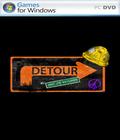Mention the words "real-time strategy," and people instantly think of building structures on a makeshift base, training all sorts of troops and heroes, sending them off to battle, and destroying enemy forces and structures until the area is conquered. That isn't an inaccurate statement, as the genre has rarely strayed away from this winning formula; when it has, the results have varied wildly. For its debut game, indie developers Sandswept Studios decided to tackle real-time strategy without armies and enemy obliteration. The result is Detour, a rather simple game that ends up being lots of fun under the right circumstances.
The objective of Detour is to deliver your truck from your factory to the goal line at the end of the map. Do this a required number of times before your opponent does, and you win. To deliver the trucks, you'll need to build roads over most land types, bridges over water, and tunnels through small hills. You can also clear debris from the field with your bulldozer to build new roads. There are built-in limits, so you don't simply go around constructing roads without consequence. Like all RTS games, everything from constructing roads to launching trucks costs money, which you earn naturally over time or build roads to gold mines to accelerate the earning rate. The other limit comes from roads not being shared among players. Building a road allows your truck to travel on it but blocks your opponents' trucks from traveling on that same piece of asphalt. Thus, the game's strategy comes from being able to build your own path to the goal line while blocking others from doing the same.
Road construction isn't the only way to stop opponents from reaching their goal. You're given several different buildings and weapons to take out the opposing trucks and roads. Some are benign, such as dynamite that can blow up roads or EMP waves that can disorient trucks for a short time. Then you have things like bombs, which can destroy items within a wider radius, and radar jamming stations, which prevent things from being seen on radar. Turrets let you defend yourself from bomb attacks and destroy enemy roads and structures in its radius. The game also goes for the absurd, with protesters who can stop opponents from building roads on wetlands, cops who can block off roads, and donut shops to lure cops.
All of this mixed together creates a chaotic but enjoyable game. The constant switching between going on the offensive by destroying roads and going on the defensive by protecting your roads and trucks forms the crux of any RTS, and seeing the game distilled into its simplest form doesn't cheapen the experience. It actually feels like it expands the experience because you don't always have to rely on stronger units and items to win. The amount of resources at your disposal helps you decide what you should spend credits on while the game's simplicity entices genre newbies to give it a try.
The single-player mode is a set of challenges instead of a comprehensive campaign. While the game tries to implement some structure by having you play as the newest member of the construction company, all you need to know is that you're going up against other companies with a tool set that's more restricted than what you'd get in a regular match. The different companies also share the same accessibility to tools, though they don't have any special abilities, so everyone on an even playing field. The challenges still manage to increase in difficulty, and while that sounds great for those interested in the single-player experience, it's short-lived since there are only 27 challenges, three of which are tutorials.
The short length of the challenges is countered by the multiplayer, which comes with a few modes. You have the standard free-for-all versus mode as well as a team-based versus mode. Both let you use just about any map, which vary wildly from small to insanely large. Once you tire of playing those maps, though, you can create your own maps of any size and share them with others. There is a survival mode, but oddly, enough, it's a single-player mode. The tower defense mode is also single-player, making you wonder why it's located in the multiplayer section. The tower defense mode is nice but too simplistic. It plays like Plants vs. Zombies, where enemy trucks are always coming in from the right side, forcing you to place turrets and wetlands to protect your factories on the left. It is a nice addition, but it lacks the enemy depth of PopCap's game, making this only good for those who have never played a tower defense game.
Multiplayer, however, is problematic because of the current availability of games. During the review period, only one online game was available, and that was because it was set up on another local computer. For a game that really shines when multiple humans are playing, the lack of a thriving community hurts it significantly, even if you replace human opponents with AI. If you can convince other friends to play, then it'll be fine. Otherwise, you won't find this to be an engaging experience with strangers if none are available.
The control scheme is a little unusual. Your standard WASD controls apply for camera control, and the left mouse button applies the selected structure to the battlefield. However, you can't just select the item from a grid with your mouse and then click on the area to apply said item. Instead, you have to either hit the hotkey for the items or use the mouse scroll wheel to highlight it before placing it on the field. RTS fans will find this difficult since the mechanics are different from what other games, but they'll get used to it after once or twice. Even then, the number of items you can scroll through and number of hotkeys that can be memorized can be daunting for those looking for a simpler entry into the genre.
Graphically, Detour has a simple but clean look. The faces that appear when some speech is being read look like they came out of a children's book. It's not a bad thing, but it isn't for those looking for a magnificent, artistic look. The environments are simple in their construction even though they have some fairly decent detail. There isn't much to the animations, but what's here is quite good, especially the visual blur placed on the screen when a large bomb is detonated. It's a style that feels old but not exactly out of place.
Like the graphics, the sound is just as simple. The sound effects come in nicely, though they aren't designed to rattle your speakers. Even the explosions provided by bombs seem good enough instead of extraordinary. The voices are restricted to mumbling, and even that is barely audible. If you never turn up your speakers, you might think there's no sound to accompany the text. About the only thing you'll hear is the music, and even then, the calm tracks seem "off" instead of what should be music evoking feelings of calamity and action. It's a conscious decision and, in a way, adds more humor to a game already filled with oddball moments.
On the surface, Detour is an enjoyable little game. The concept is novel, while the gameplay provides some simple but chaotic experiences. The low graphics requirements ensure that just about anyone can run it though players will struggle with the unorthodox control scheme. While the single-player experience is good in some places, it's the multiplayer that really drives the game. If the online community were more vibrant, then this would be a perfect game to get given its relatively low price. As it stands, it's still a recommended title provided you have friends who are willing to jump in with you.
Score: 7.5/10
More articles about Detour











 Detour is a road-oriented Real-Time Strategy game that takes a satirical twist on highway construction, environmental activist groups, and cartoon humor. Players compete against each other and/or AI opponents to outsmart and out-build them.
Detour is a road-oriented Real-Time Strategy game that takes a satirical twist on highway construction, environmental activist groups, and cartoon humor. Players compete against each other and/or AI opponents to outsmart and out-build them.


































